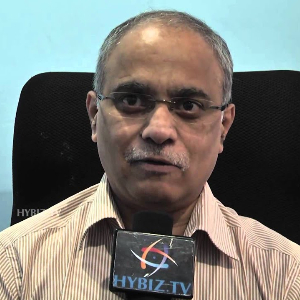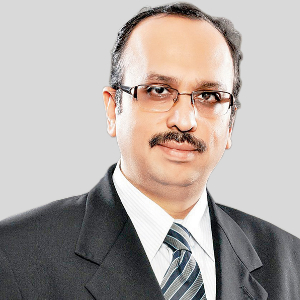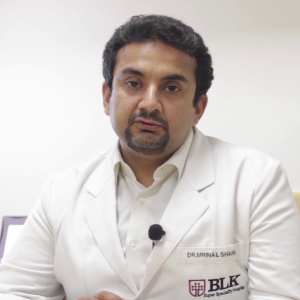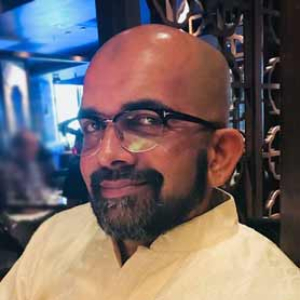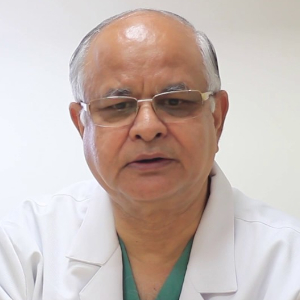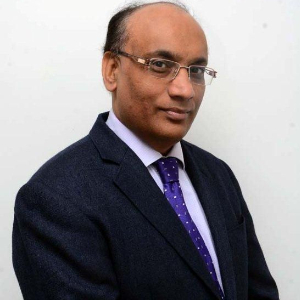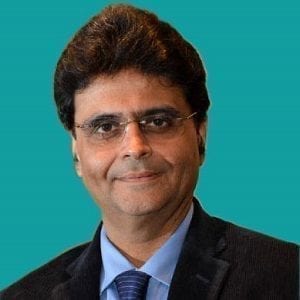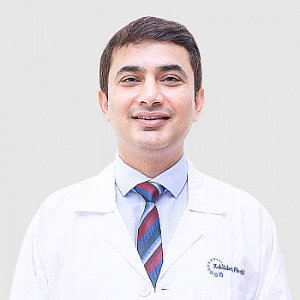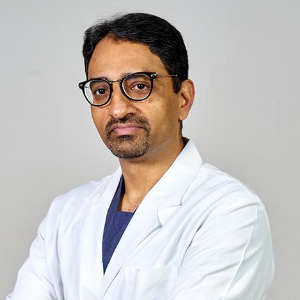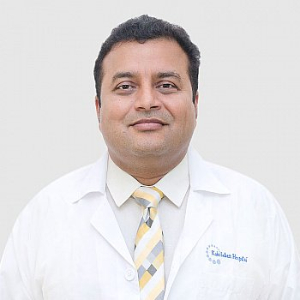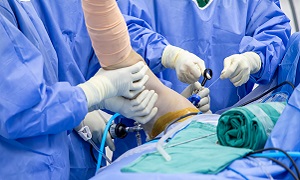Best Doctors in India for Dislocated Shoulder Treatment
- Orthopedic Surgeon, Hyderabad, India
- Over 30 years’ experience
Profile Highlights:
- Dr. J V S Vidya Sagar is a renowned Orthopedic Surgeon and one of the most experienced surgeons for Arthroscopy in India.
- Dr. Vidya Sagar has been performing Arthroscopic and Joint Replacement surgeries for over 30 years during which he has performed 31,500 Arthroscopies, 13,400 joint replacement surgeries, 27, 600 knee joint surgeries, and 20,800 surgeries for ligament reconstruction, and over 38,600 surgeries for cerebral palsy and polio.
- Orthopedic Surgeon, Mumbai, India
- Over 25 years’ experience
Profile Highlights:
- Dr. Kaushal Malhan is a renowned Orthopedic Surgeon in Mumbai with expertise in hip and knee replacement surgery and regional resurfacing.
- Dr. Kaushal Malhan’s name has been recorded in the Limca Book of Records for his innovative Tissue Preserving Total Knee Replacement Technique that helps in reducing post-operative recovery time.
- Dr. Malhan pioneered computer-assisted joint replacement surgery in India and is the first orthopedic surgeon to perform gender-specific computer-assisted and minimally invasive knee replacement.
- Orthopedic Surgeon, New Delhi, India
- Over 20 years’ experience
Profile Highlights:
- Dr. Mrinal Sharma is a highly renowned Orthopedic Surgeon and Joint Replacement Specialist with a specialization in Arthroplasty.
- Dr. Mrinal Sharma holds with him an experience of more than a decade and has achieved huge success with joint replacement procedures, especially of the knee, during his career.
- He is among the new generation of Orthopedic surgeons who use Computer Navigated techniques for performing knee and hip replacement surgeries.
- Orthopedic Surgeon, Mumbai, India
- Over 20 years’ experience
Profile Highlights:
- Dr. Murali Poduval is a well-known Orthopedic surgeon in Mumbai with a specialization in Joint Replacement surgeries.
- He holds an extensive experience of close to 2 decades in Orthopedics and Joint replacement surgery and is an expert in the management and treatment of deformity correction, arthroplasty, and complex trauma.
- He is highly skilled in performing all types of primary and revision surgeries on the hip, knee, and spine. His primary interest also includes hip arthroplasty for severe defects in children and adolescents.
- Orthopedic Surgeon & Spine Surgeon, New Delhi, India
- Over 40 years’ experience
Profile Highlights:
- Dr. Pradeep Sharma is the Director of the BLK-Max Centre for Orthopedics, Joint Reconstruction, and Spine Surgery in Delhi.
- Dr. Pradeep Sharma has an experience of 40+ years in the field and is an expert in the treatment of both adult and pediatric patients.
- Dr. Pradeep Sharma runs arthroplasty Fellowships supported by Zimmer and Stryker and has trained and mentored young surgeons in Arthroplasty.
- Orthopedic Surgeon, Kolkata, India
- Over 30 years’ experience
Profile Highlights:
- Dr. Rakesh Rajput is the Director and HOD – Orthopedics at The Calcutta Medical Research Institute (CMRI), Kolkata.
- Dr. Rakesh Rajput’s expertise lies in Joint replacement surgeries for the knee and hip, Arthroscopy, and Pelvic and Ace tabular trauma. He is also highly skilled in Minimally invasive orthopedic surgeries.
- Dr. Rakesh Rajput received his training in Joint replacement procedure from the prestigious University of Dundee and has worked and trained under some of the best orthopedic surgeons in the world.
- Orthopedic Surgeon & Spine Surgeon, Mumbai, India
- Over 25 years’ experience
Profile Highlights:
- Dr. Ram Chaddha is a specialist Spine Surgeon in Mumbai with expertise in the management and treatment of all kinds of spinal disorders for over 25 years.
- Dr. Chaddha is trained in Minimally Invasive Spine Surgery and is also among the few surgeons in India to hold expertise in Minimally Invasive Cosmetic Spine Surgery.
- Dr. Ram Chaddha spent a considerable number of years training undergraduate and postgraduate students and has also been an examiner for such courses at Mumbai University.
- Orthopedic Surgeon, Mumbai, India
- Over 24 years’ experience
Profile Highlights:
- Dr. Shreyash Gajjar is one of the most accomplished Arthroscopic and Sports Orthopedic surgeons in India and has performed more than 3000 surgeries of which more than 2500 included arthroscopic surgeries.
- Dr. Shreyash Gajjar is the first orthopedic surgeon in India to perform several first surgeries with the use of arthroscopic procedures.
- Dr. Shreyash Gajjar received his training in Arthroscopy, Trauma, and Sports Medicine from the best orthopedic institutions and under the guidance of renowned surgeons in India, UK, and Australia.
- Orthopedic Surgeon, Gurugram, India
- Over 20 years’ experience
Profile Highlights:
- Dr. Subhash Jangid is a renowned Orthopedic Surgeon in India who performs more than 600 joint replacement surgeries annually and helps in the management of patients after such procedures.
- He played a pioneering role in establishing the first Bone Bank in India at the All India Institute of Medical Science in 2002.
- He has been associated with several other prestigious hospitals both in India and abroad and has also been a Visiting faculty at Nnamdi Azikiwe University Teaching Hospital in Nigeria where he trains young surgeons in Arthroplasty.
- Orthopedic Surgeon and Spine Surgeon, Mumbai, India
- Over 20 years’ experience
Profile Highlights:
- Dr. Vishal Peshattiwar is a leading Spine Surgeon in Mumbai specializing in Minimally Invasive Spine Surgeries (MISS)
- He has an experience of more than 2 decades in spine surgery and holds the credit of performing over 4000 spinal surgeries to
- He is the first in India to use the MISS technique on a patient with liver failure and Tuberculosis.
- Dr. Vishal Peshattiwar’s most notable case till date was performing a Revision Spine Surgery through MISS on the oldest patient in India.
Best Hospitals in India for Dislocated Shoulder Treatment
Paras Hospital, Gurugram
- City: Gurugram, India
Hospital Highlights:
- Paras hospital was established in 2006 and is the 250 bedded flagship hospital of Paras Healthcare.
- The is supported by a team of doctors of international and national repute.
- The hospital is NABH accredited and also the first hospital in the region to have a NABL accredited laboratory.
- The hospital provides specialty medical services in around 55 departments including Neurosciences, Joint Replacement, Mother & Child Care, Minimal Invasive Surgery, Gynecology and Obstetrics, Ophthalmology, Dermatology, Endocrinology, Rheumatology, Cosmetic and Plastic surgery.
- The hospital is equipped with state-of-the-art technologies.
S L Raheja Hospital, Mahim, Mumbai
- City: Mumbai, India
Hospital Highlights:
- SL Raheja hospital is a 140-bed multi-specialty tertiary care hospital that is being managed by Fortis Healthcare Ltd.
- The hospital is a benchmark in healthcare and medical facilities in the neighborhood of Mahim & the western suburbs.
- L.Raheja Hospital, Mahim has one of the most effective ICU and Casualty care services.
- The hospital provides specialty medical services in Cardiology, Oncology, Neurology, Orthopedics, Mother & Child Care, and in Diabetes.
Wockhardt Hospitals, Mumbai
- City: Mumbai, India
Hospital Highlights:
- Wockhardt Hospitals were established in the year 1973, originally called First Hospitals and Heart Institute.
- Wockhardt Hospitals are super specialty health care networks in India, nurtured by Wockhardt Ltd, India’s 5th largest Pharmaceutical and Healthcare company.
- Wockhardt Hospitals is associated with Partners Harvard Medical International, an international arm of Harvard Medical School, USA.
- Wockhardt Heart Hospital performed India’s first endoscopic heart surgery.
- The hospital has a state-of-the-art infrastructure equipped with the latest technologies and modern equipment.
- It has special Centers of Excellence dedicated to the major specialties to provide hassle-free and high-quality clinical care.
Pushpawati Singhania Hospital & Research Institute, New Delhi
- City: New Delhi, India
Hospital Highlights:
- Established in 1996, Pushpawati Singhania Research Institute is one of the top hospitals in the NCR region, as well as one of the top facilities in India for gastroenterology. The hospital is one of South Asia’s first institutes in medical and surgical treatment for diseases related to digestion.
- The hospital is equipped with state-of-the art facilities coupled with the latest equipment as well as renowned consultants from various parts of India as well as other parts of the world.
Indian Spinal Injuries Center, New Delhi, India
- City: New Delhi, India
Hospital Highlights:
- The Indian Spinal Injuries Center (ISIC), provides state-of-the-art facilities for the management of all types of spinal ailments.
- Staffed with internationally trained, acclaimed, and dedicated spine surgeons, the hospital provides cutting-edge medical & surgical technology. The hospital provides comprehensive management of spinal injury, back pain, spinal deformities, tumors, osteoporosis, etc.
- The hospital performs motion-preserving spine surgeries including disc replacement and dynamic fixation, and minimally invasive spine surgeries such as endoscopic disc excision.
- The orthopedic service of the hospital covers all orthopedic ailments including trauma, joint diseases & replacements, oncology, pediatric orthopedics & upper limb ailment.
W Pratiksha Hospital, Gurgaon
- City: Gurugram, India
Hospital Highlights:
- W Pratiksha Hospital, Gurugram, is one of the best hospitals in the NCR region. It is also a top hospital in India for IVF. Since its inception, the hospital has performed over 5500 successful IVFs. The hospital also specializes in gynecology.
- With over 20 years of experience in providing quality healthcare, the hospital is known as one of the most trusted and valued health providers in India.
- Equipped with world-class medical facilities and advanced technology, the hospital’s doctors and clinicians also have a track record of delivering excellent results. The hospital is also known for focusing on preventive well-being as much as on curative treatment.
- The hospital has earned the trust of its patients, by providing the best available treatments at affordable costs.
Narayana Superspeciality Hospital, Gurugram
- City: Gurugram, India
Hospital Highlights:
- Situated near DLF Cyber City, Gurugram, Narayana Superspecialty Hospital is one of the top medical facilities in the Delhi NCR region, catering to the needs of the people. Known for its commitment to quality medical care and patient service, the hospital is a state-of-the-art facility with planned and well-equipped sections, which includes a spacious OPD area as well as comfortable patient rooms.
- It is the closest super-specialty hospital from Indira Gandhi International Airport towards Gurugram, and also the nearest super specialty hospital from DLF Cyber City. It is also close to major residential areas in Gurugram.
- It is part of the renowned Narayana Health Group. Established in 2000, by Dr. Devi Shetty, a renowned cardiac surgeon, it has grown to be one fo India’s leading healthcare groups.
Sir Ganga Ram Hospital, New Delhi
- City: New Delhi, India
Hospital Highlights:
- Sir Ganga Ram Hospital, New Delhi is known to provide the latest medical procedures with the latest technology in all of its units.
- The hospital has a team of reputed doctors, nurses, and healthcare professionals that ensure that patients receive quality care at affordable costs.
- Staffed with a team of highly qualified doctors, dedicated nurses, and paramedical and non-medical staff, the hospital aims to lead in healthcare delivery, medical education, training, and research.
- As per the vision of the founder, the hospital also provides free treatment to the economically weaker sections of society.
- Sir Ganga Ram Hospital also provides training to young doctors under the Diplomate in National Board(DNB) program. The DNB program at the hospital was started in 1984 and it is known for currently running the maximum number of DNB specialties in the country. It also has the distinction of having the first bone bank in India.
CK Birla Hospital, Gurugram
- City: Gurugram, India
Hospital Highlights:
- The CK Birla Hospital in Gurugram is a NABH-accredited multi-specialty hospital.
- The hospital strives to increase the quality of healthcare by focusing on UK NHS nurse and midwife training requirements. Policies and practices derived from the National Institute for Health and Treatment Excellence (NICE) recommendations in the United Kingdom ensuring that a strong focus on safety, high-quality clinical care, and sanitation is maintained.
- The hospital’s cutting-edge technology and facilities allow for real-time communication and seamless collaboration among caregivers, ensuring accuracy and the best possible results. Those with foreign experience and accreditations make up part of the hospital’s team of clinicians.
KIMS Hospital, Hyderabad
- City: Hyderabad, India
Hospital Highlights:
- KIMS Hospital (a brand name of Krishna Institute of Medical Sciences) is one of the largest and best multi-speciality hospitals in Hyderabad. The hospital provides various treatments to an enormous number of patients.
- The hospital has a capacity of more than 3000 beds. KIMS Hospitals offers different healthcare services in more than 25 specialities and super specialities.
- The hospital is equipped with modern medical equipment and technology. It has robotic equipment to provide minimal invasive techniques for patients.
- The hospital is aimed at providing world-class healthcare facilities and services at an affordable cost for patients.
- The various specialities and departments of the hospital include neurosciences, gastroenterology & hepatology, robotic science, reproductive sciences, dental science, oncological sciences, organ transplantation, heart and lung transplantation and mother and child care.
Dislocated Shoulder
Dislocated shoulder is an injury in which the upper arm bone pops out of the cup-shaped socket which is a part of your shoulder blade. Your shoulder is the most mobile joint in the body, and it allows the arm to move in multiple directions. Due to this ability to move, the shoulder is not only unstable but also the most dislocated joint in the body.
Shoulder dislocations occur when the head of the humerus is removed forcibly from the socket in the glenoid fossa. The shoulder can get dislocated in several different directions, and a dislocated shoulder is described by the location, where the humeral head ends up after it gets dislocated.
Dislocations in younger people generally arise from trauma, which is usually associated with sports such as football or basketball. When it comes to older people, they are prone to dislocations due to the gradual weakening of the ligaments and cartilage that supports the shoulder. Even in such cases, some force needs to be applied to the shoulder joint to make it dislocated.
If you suspect a dislocated shoulder, it is important to seek prompt medical attention.
Symptoms
A dislocated shoulder generally shows the following signs and symptoms:
- A visibly deformed or out-of-place shoulder
- Intense pain
- Inability to move the joint
- Swelling
- Bruising
Sometimes, the dislocation might also cause numbness, weakness, or tingling near the injury, such as in your neck or down your arm.
If you suspect a shoulder dislocation, see a doctor right away. While you are waiting for medical attention, please note the following points:
Don’t move the joint – Splint or sling the shoulder joint in its current position and remember not to try to move the shoulder or force it back into its place. This can cause damage to the shoulder joint as well as its surrounding muscles, ligaments, nerves, or blood vessels.
Ice the injured joint – You can choose to apply ice to your shoulder as this can help you to reduce pain and swelling as it controls any internal bleeding and the buildup of fluids in and around your shoulder joint.
Causes & risk factors
The shoulder joint is known to be the most frequently dislocated joint in the human body and since it moves in several directions, your shoulder can get dislocated downward, forward, backward, completely, or partially. However, most dislocations are known to occur through the front of the shoulder.
A strong force, such as a sudden blow to your shoulder, is required, to pull the bones out of their place. In some cases, extreme rotation of your shoulder joint can also pop the ball of your upper arm bone out of your shoulder socket.
In most cases, a dislocated shoulder is caused by sports injuries. A hard blow to your shoulder during a motor vehicle accident is also a common cause. You may also dislocate your shoulder during a fall, such as from a ladder.
Diagnosis
When a patient shows signs of a shoulder dislocation; pain control, and joint relocation are the primary considerations. However, at the same time, your doctor needs to understand the mechanism of injury and the circumstances surrounding it. It is important to know if this is the first shoulder dislocation or whether the joint has suffered injury previously. In addition, your doctor might ask a few questions about medications, allergies, the time of the last meal, as well as your past medical history.
Physical examination of the shoulder will be required, and it will begin with an inspection. Plain X-rays are also most likely going to be required, to confirm the diagnosis of shoulder dislocation, and to make certain there are no broken bones associated with this dislocation.
Treatment
If your shoulder dislocation is simple, without any major nerve or tissue damage, then the shoulder joint is likely going to improve over a few weeks. It is best not to resume activity too soon after your shoulder dislocation, as it might cause not only cause injury to your shoulder joint, but it may cause it to dislocate again.
If your shoulder dislocation is serious, the following treatments may follow:
Closed reduction
Your doctor is going to try certain gentle maneuvers which should likely help your shoulder bones get back into their correct position. Depending on the amount of pain and swelling, you may also require a muscle relaxant or sedative or, in rare cases, a general anesthetic before manipulation of your shoulder bones. When your shoulder bones are back in their place, the pain should go almost immediately.
Medication
Surgery
Immobilization
A special splint or sling might be used for some days to keep your shoulder from moving. How long you will need to wear the splint or sling will depend on the nature of your shoulder dislocation and how soon the splint is applied after your dislocation.
Rehabilitation
After your shoulder splint or sling is removed, you’ll need to start a gradual rehabilitation program which is designed to restore range of motion, as well as strength and stability to your shoulder joint.

